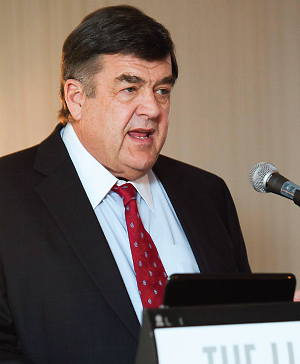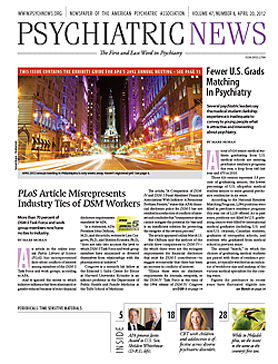The importance of advocacy in effecting meaningful change and putting a spotlight on the issues that impact the practice of psychiatry and the lives of those with mental illness was the rallying cry at this year’s annual APA Advocacy Day event, held March 12 to 14 in Washington, D.C.
Eighty-six APA members representing 46 states visited more than 230 congressional offices during Advocacy Day 2012, advocating for such issues as the continued support of programs for returning veterans and their families, the design of parity-compliant essential health benefits packages offered through new health-exchange plans, and the permanent repeal of Medicare’s sustainable growth rate formula for determining physician reimbursement.
From the start of the event, APA Medical Director James H. Scully Jr., M.D., reminded attendees not only of the importance of the work they will do while meeting with congressional insiders on Capitol Hill, but the need for them to inform their colleagues back home about the importance of member advocacy.
“You are thought leaders, scientists, and major players,” said Scully in his welcoming remarks. “You’re the ones who carry the message. Let’s get this machine really working the way it should.”
Attendees received specific advice on how to frame an effective advocacy message from Scott Barnes, director of APA’s political action committee—APA PAC—and deputy director for political affairs in APA’s Department of Government Relations. Among Barnes’s key recommendations were to share professional knowledge without relying on clinical jargon and to be prepared to respond calmly to opposing viewpoints.
Several Advocacy Day guest speakers also provided words of insight and encouragement. Larry Sabato, Ph.D., director of the University of Virginia Center for Politics, offered his political prognostications; Rep. C.A. “Dutch” Ruppersberger (D-Md.) addressed the still-pervasive stigma affecting soldiers with posttraumatic stress disorder; and Andrew Imparato, senior counsel and disability policy director for the Senate Health, Education, Labor, and Pensions (HELP) Committee, spoke of HELP Chair Sen. Tom Harkin’s (D-Iowa) desire to promote better employment outcomes for individuals with mental illness and disabilities.
At the conclusion of the information-packed event, it was clear that all of the psychiatrist-advocates in attendance were emboldened by the opportunity to communicate with those directly involved in shaping future mental health care policy.
“Lobbying is educating,” said Jeffrey Akaka, M.D., a veteran Advocacy Day attendee who is president of the Hawaii Psychiatric Medical Association, APA’s incoming Area 7 Trustee, and a past speaker of the APA Assembly. “It is our responsibility to do it for our patients and our profession. If we don’t, then decisions that affect us will be at best uninformed, at worst, dangerous. For APA to facilitate these meetings, to demonstrate to our elected officials our commitment to assisting them in building healthier communities over the long haul, has been immensely helpful in our efforts in Hawaii.”
For rookie attendees and APA members-in-training, Advocacy Day had additional meaning.
“I would love to see Advocacy Day become a mandatory part of our training,” said Steve Koh, M.D., M.P.H., a research fellow in geriatric psychiatry at the University of California, San Diego. Among the positions he has held at APA is the Area 6 deputy representative to the Assembly Committee of Area MITs. “I think it’s easy to become focused on the clinical aspects of psychiatry without considering the critical impact of legislation on our everyday practice and the lives of our patients.”
Koh’s sentiment was echoed by Anne Lin, M.D., an assistant professor of clinical psychiatry at the University of Utah, who attended Advocacy Day for the first time. “I think it’s very important for young psychiatrists to advocate,” said Lin. “I’ve learned that most lawmakers are good people. It’s really just a matter of building relationships and sharing our knowledge.”



